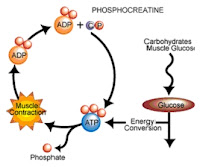Metabolism is the process by which living things grow and repair their bodies and produce energy needed for life. Metabolism includes all the chemical changes that take place in the protoplasm of the cell. The changes which build up new protoplasm from simpler materials are called anabolic metabolism. The changes which break down parts of the protoplasm are catabolic metabolism.
All metabolic processes use food as the raw material for supplying energy and building new tissues. Foods include water, minerals, vitamins, carbohydrates (starches and sugars), proteins, and fats. The latter three are changed by digestion to simple sugar, amino acids, fatty acids, and glycogen, which can be assimilated. Glucose, fats and amino acids may be used to form a basic part of protoplasm, oxidized to give the body the heat and energy it needs, or stored for future use.
